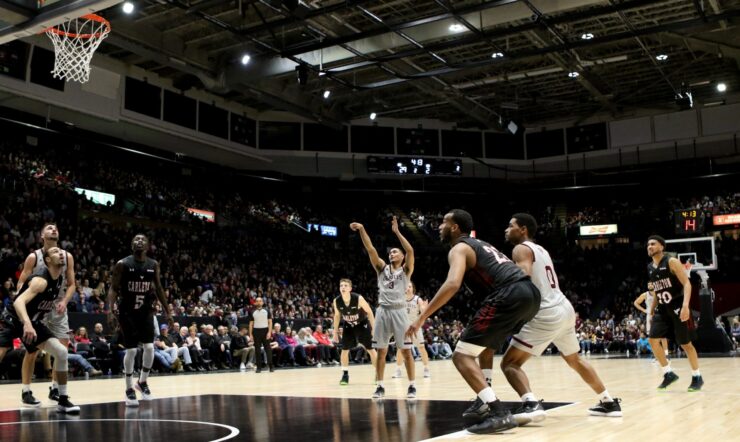Back to play protocol delayed for former captain of basketball team following hospitalization
Kellie Forand, a masters student in communication at the University of Ottawa and a valedictorian from the Faculty of Arts, was delayed from rejoining the Gee-Gees Basketball team after being diagnosed with bipolar disorder in February.
Forand, who was captain of the team, explained that the diagnosis came after she was hospitalized for three weeks following a psychotic episode.
“It’s still hard for me to think about what I did, because it wasn’t me, and I remember everything,” she said.
After being released three days before the team’s senior night and last home game of the season, Forand was hopeful to return to the team, and got the greenlight from her doctors, but not from the university.
Forand’s coaches told her that she would be ready to play in a few weeks, not a few days, effectively ruling her out of the seniors game, although her coach and teammates honoured her with a ceremony for her contributions to the team that night. In addition to this, she was not allowed to be near her team members, which meant she couldn’t enter the gym or the weight rooms.
“When you’re told you’re detrimental to your team, you’re a threat to your team, you’re a distraction to your team, your teammates don’t feel comfortable with you around, it’s very hard. Especially as a fifth year, as a captain, just as someone who really deeply cares,” she said.
“You need to able to hear me say words like bipolar and suicide without thinking, ‘oh that’s a problem person.’”
The team’s coach, Andy Sparks, explained the decision as something that was taken for Forand’s benefit, expressing his desire to have her back on the team, but acknowledging that she was not 100 per cent healthy immediately after being released from the hospital.
“From what we had heard from numerous people, jumping out of the hospital and right back into play is something that certainly was not seen as being a logical step,” he said.
This decision followed a meeting with Forand’s psychiatrist at the hospital, her sports psychiatrist, her sports doctor, and her family doctor, who all told her that she was ready to rejoin the team.
Forand also explained that the U of O failed to listen to recommendations made by Dr. Carla Edwards of McMaster University, who specializes in back-to-play protocols for Olympic and elite athletes.
Sparks recognizes that the two sides saw the situation differently, and believes that it’s important to bridge that gap so that similar situations don’t occur in the future.
“(The school needs to be) developing protocols that work for people with mental illness so that we have a much better insight, because as (Forand) said, when she may feel like she’s ready to return to play, she may not be ready yet. And the players who have gone through with her have to understand what the direction and protocol is for how’s she’s recovering and how it all fits in.”
“We see the depression and the anxiety and all that stuff pretty frequently, but this is new. And with (Forand) being the super intelligent person that she is, she’s going to be able to offer a lot for the direction that these things will go over the course of time,” he said.
According to Sparks, the university is looking at ways to correct these issues, such as creating a protocol for mental health, as well as working with former U of O Women’s Basketball player Krista Van Slingerland to facilitate the communication between coaches and athletes that are depressed, or have a mental illness.
Forand said that although she doesn’t blame her coaches or teammates as a proud Gee-Gee, she does have some suggestions for what should be done, in terms of standardized guidelines, to help end the stigma which around mental health, not only at the U of O, but at universities across the country.
“(Are mental illness situations) case-by-case? Yes and no. It’s not like a physical injury, you tear your ACL, I tear my ACL, it’s the same thing. That’s not how it works, but still we can create some guidelines, and some general way of dealing with things.”
A previous version of this article was published on March 19 and was shortly retracted due to the factual errors. The current version of this article has been updated with corrections.






